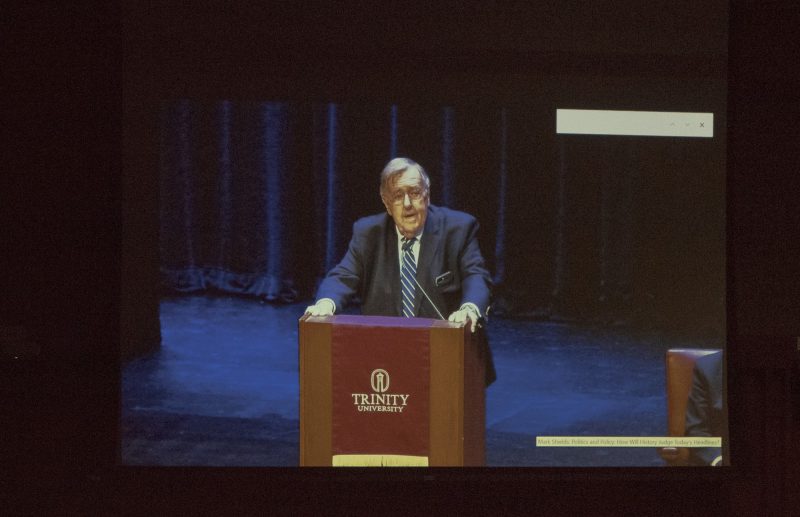As part of the annual Maverick Lecture series, Mark Shields, veteran political analyst and weekly commentator on PBS NewsHour since 1988, visited Trinity’s campus to deliver a lecture on “Politics and Policy: How Will History Judge Today’s Headlines?” The lecture was held in Stieren Theater and the audience filled the venue to its capacity of 497 seats.
The Maverick Lecture series was started in 2008 and is paid for by the William and Salome Scanlan Foundation, which was organized in 1994 by John Scanlan and William Scanlan Jr. to honor their parents. Scanlan Jr. was present and introduced Mark Shields as speaker.
Although the lecture was put on in partnership with Trinity, the majority of audience members were members of the San Antonio community with very few Trinity students attending.
“[Shields] is a nationally known columnist and commentator, he’s worked in Washington through the administration of 10 presidents, he is an editorial writer for the Washington Post, and he began writing his column in 1979,” Scanlan said.
Shields began his lecture with several jokes pertaining to the political arena and kept the tone of his speech light by peppering in several more anecdotes throughout the lecture. He first began by defending Washington, DC.
“I’m a little defensive about my hometown; I want to establish that not all political scandals take place in Washington,” Shields said. “Not that many hours drive from here, last week in a state prison, one convict turned to his cellmate and said, ‘You know, the food was a lot better here when you were governor.’ ”
Shields then addressed his stance on the importance of politics, although many people have become disheartened in them.
“I like politics. I believe in politics,” Shields said. “I don’t know how else a nation as big and brawling and wonderfully diverse as ours, how else we would resolve our differences, except through the political process.”
Shields then went on to discuss a quality in Ronald Reagan that he found important, and that he believes is missing in political leaders or potential political leaders today.
“[Reagan] was the embodiment of American optimism, truly in the best sense of the word,” Shields said. “He had about him a quality that I think is desperately needed in today’s leaders and would-be leaders, and that was the ability to laugh at himself.”
Shields then shared an anecdote concerning a “factoid,” which he described as not quite fact and not quite fiction, that Reagan once told that showcased his ability to laugh at himself.
“Reagan delivered what remains my all-time favorite factoid: ‘Trees cause more pollution than automobiles.’ Our next stop was in southern California; it was the worst air pollution inversion in the Los Angeles basin in 11 years. Some wise guy graduate student had hung a sign on a tree that said: ‘Cut me down before I kill again,’ ” Shields said. “To his credit, nobody laughed harder than Ronald Reagan.”
Sophomore Christina Ridlen, one of few students at the lecture, also agreed that it is important for leaders to be easy-going and able to laugh at themselves.
“I think you have to [be] open to hearing different opinions about yourself. I know Obama was able to joke about how people said ‘Thanks, Obama.’ He was able to laugh along with people,” Ridlen said. “I think you have to be open to criticism; not everyone is going to like you, and that’s okay. The way that you accept criticism shouldn’t reflect badly on your country because you are the leader of your country.”
Shields also discussed the shift that has occurred demographically in politics over just the past 10 years and the reasons behind such drastic change.
“On election day of 2008, Barack Obama was 55 percent favorable among all voters. John McCain was 52 percent favorable among all voters. So voters were choosing between two favorable people; they liked them both. It was a positive choice,” Shields said. “In 2016, Hillary Clinton was 43 percent favorable and 55 percent unfavorable. Donald Trump was 38 percent favorable and 60 percent unfavorable. So that meant Trump got the votes of several million people who had an unfavorable opinion of him, as did Clinton. It was a negative choice in 2016.”
Shields went on to discuss that such unfavorability of both candidates has led to dissatisfaction with political authority, driving a large voter turnout and an uprising of Democratic seats in the House of Representatives during the recent 2018 midterm elections.
“[The 2018 election] was a rather remarkable election, not simply in the sense that Democrats picked up 40 House seats, which is the most that Democrats have won since Watergate in 1974, but that they won the popular vote in the country by almost 9 million votes; that’s more than any presidential margin of victory since 1984,” Shields said.
Ridlen believes that such a large demographic change from 2016 to 2018 was a result of citizens realizing the worth of their vote and being more involved in the voting process.
“[In 2016,] not enough people believed that their vote mattered, and it was kind of a wake-up call when we saw the statistics of [Trump’s] unpopularity, and he had still won; that was a wake-up call to people and young voters,” Ridlen said.
Shields concluded his lecture by urging bipartisan cooperation and working towards unity.
“We can’t let pessimism infect us, we just can’t. In the final analysis, the question is not: ‘Are you better off than you were four years ago?’ The question is: ‘Are we better off? Are the weak among us more protected? Are the strong among us more just?’ ” Shields said.







